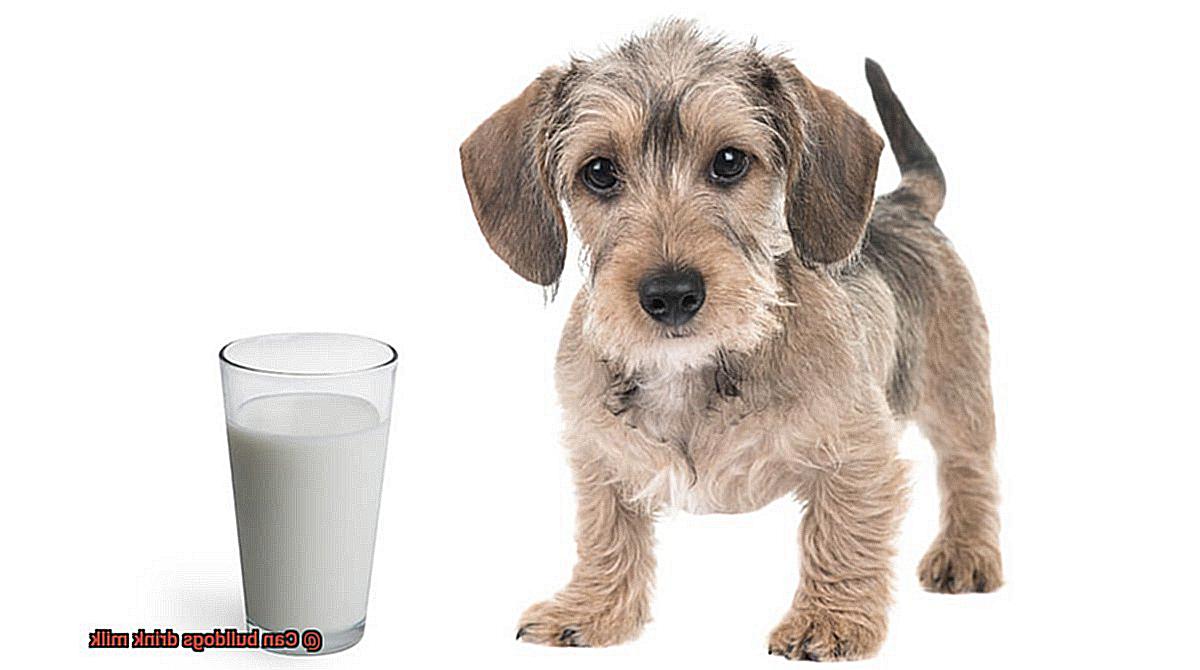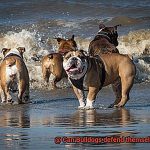Can bulldogs drink milk?
When it comes to our furry friends, we’re constantly faced with dietary dilemmas that can leave us scratching our heads. And one of these quandaries revolves around whether or not Bulldogs can indulge in a saucer of milk. But let me tell you, the truth is far from clear-cut.
To crack the code on milk and Bulldogs, we need to understand their unique digestive system and dietary needs. These adorable wrinkly-faced pups are prone to certain health issues, including lactose intolerance. That’s right – just like some humans, Bulldogs may have trouble digesting milk due to a lack of lactase, the enzyme needed to break down lactose.
Research shows that about 65% of dogs, including Bulldogs, fall into the lactose intolerant camp. This means that feeding them milk could lead to unpleasant tummy troubles like bloating, gas, and diarrhea. Not exactly what we want for our four-legged pals in the long run.
Sure, some Bulldogs might handle milk without any immediate symptoms. But it’s important to think about the bigger picture. Regular milk consumption can contribute to weight gain and obesity in these already predisposed pooches, exacerbating their respiratory and joint issues.
As responsible Bulldog owners, it’s crucial that we prioritize their well-being and make informed decisions about their diet. With all these potential complications linked to milk consumption, it might be wise to explore alternative sources of hydration and nutrition for our beloved pets.

Remember – consulting with your veterinarian is key when it comes to figuring out your Bulldog’s specific dietary needs. They’ll be able to steer you towards suitable milk alternatives that keep your furry friend healthy, happy, and free from tummy troubles.
In the following sections, we’ll dive deeper into why Bulldogs struggle with lactose intolerance, explore nutritious alternatives to milk, and arm you with the knowledge needed to make the best choices for your canine companion. So, stick around as we unravel the truth behind the milk and Bulldogs puzzle.
The Dangers of Milk for Bulldogs
Contents
- 1 The Dangers of Milk for Bulldogs
- 2 Alternatives to Milk for Bulldogs
- 3 Introducing New Foods to Your Bulldog’s Diet
- 4 Water as the Primary Source of Hydration for Bulldogs
- 5 How Can You Tell if Your Bulldog is Lactose Intolerant?
- 6 Benefits of Dairy-Free Diets for Bulldogs
- 7 Finding the Right Dairy Products for Your Bulldog
- 8 Common Digestive Issues in Bulldogs
- 9 Conclusion

When it comes to our furry friends, we want to ensure they receive the best care possible. French Bulldogs, known for their adorable squishy faces and playful personalities, are no exception. However, it’s crucial to be aware of certain dietary considerations for bulldogs, including the potential dangers of milk consumption. In this article, we’ll explore why milk may not be the best choice for your French Bulldog and provide alternative options to keep them healthy and happy.
Sensitive Stomachs and Lactose Intolerance:
French Bulldogs are known for their sensitive digestive systems, and many of them suffer from lactose intolerance. Lactose is the sugar found in milk, and bulldogs lack the enzyme lactase required to break it down effectively. This can lead to gastrointestinal issues such as diarrhea, vomiting, and gas. Nobody wants their beloved Frenchie suffering from an upset tummy.
Allergic Reactions and Obesity Risks:
In addition to lactose intolerance, Bulldogs may also develop allergic reactions to milk proteins. These reactions can manifest as skin irritations, itching, or even respiratory problems. Furthermore, the high fat content in milk can contribute to obesity in Bulldogs if consumed regularly. We all want our Frenchies to maintain a healthy weight and enjoy a long, active life.
Alternatives to Milk:
Fortunately, there are alternatives available if you still want to incorporate dairy into your Bulldog’s diet. Lactose-free milk or yogurt specifically made for dogs can be considered. These products have reduced lactose content or contain lactase enzymes that aid in digestion. Just remember to introduce any new food gradually and monitor their response for any adverse effects.
Hydration is Key:
While dairy products can be tempting treats for our furry friends, it’s essential to remember that water should always be their primary source of hydration. Providing fresh water throughout the day is crucial for their overall health and well-being. So, let’s keep those water bowls filled and tails wagging.
Consult with Your Vet:
As with any dietary decision for your French Bulldog, it’s always best to consult with your veterinarian. They can provide personalized advice based on your Frenchie’s specific needs and help you make informed decisions regarding their diet.
Alternatives to Milk for Bulldogs
French Bulldogs, with their sensitive stomachs, may not be able to handle milk due to potential digestive issues and lactose intolerance. Luckily, there are alternative options that can provide similar nutritional benefits without the risk of upset tummies. Let’s explore these alternatives and their potential health benefits for your adorable Frenchie.
- Lactose-free or low-lactose milk: These products have reduced lactose content, making them easier for dogs to digest. They still contain essential nutrients like calcium and protein, which are important for your bulldog’s bone health.
- Goat’s milk: Considered more easily digestible for dogs compared to cow’s milk, goat’s milk contains less lactose and different proteins that may be better tolerated by bulldogs. It is also rich in vitamins and minerals, supporting your Frenchie’s overall health.
- Plant-based milks: Almond milk or coconut milk can be used as alternatives to cow’s milk. Ensure they do not contain any harmful additives or artificial sweeteners that could be toxic to dogs. These plant-based milks can provide hydration and some nutrients, but it’s important to consult with your veterinarian to ensure they meet your Frenchie’s specific dietary needs.
Remember, always consult with your vet before introducing any new food or drink into your bulldog’s diet. They can provide personalized guidance based on your Frenchie’s individual needs and existing health conditions.
In addition to milk alternatives, hydration is crucial for bulldogs. Ensure they have access to fresh water at all times. Providing a balanced and nutritious diet that meets their dietary requirements is key to keeping your Frenchie healthy and preventing any potential digestive issues.
Introducing New Foods to Your Bulldog’s Diet
When it comes to introducing new foods to your bulldog’s diet, it’s essential to proceed with caution. Bulldogs are notorious for their sensitive digestive systems, so taking it slow is the key to success. In this section, we’ll explore the ins and outs of introducing milk to your bulldog’s diet.
The Lactose Conundrum
Before even considering milk as a potential addition to your bulldog’s menu, it’s crucial to understand the lactose factor. Lactose is the sugar found in milk, and not all dogs can tolerate it. Many bulldogs lack the necessary enzyme, lactase, to break down lactose properly. So, before you pour that creamy goodness into your Frenchie’s bowl, consult with your veterinarian first. They can offer valuable advice tailored to your dog’s specific needs and health conditions.
Choosing the Right Milk
If your veterinarian gives you the green light to give milk a try, it’s crucial to choose the right type. Full-fat cow’s milk is a no-go due to its higher lactose content. Instead, opt for lactose-free or low-lactose alternatives like goat’s milk or specially formulated dog milk. These options provide nutrients without wreaking havoc on your bulldog’s tummy.
The Gradual Approach
Now that you’ve chosen the perfect milk alternative for your furry friend, it’s time to introduce it gradually. Start with small amounts and closely monitor their reaction. Keep an eye out for any signs of discomfort or digestive upset such as diarrhea, gas, or bloating. Remember, every bulldog is unique, so their tolerance may vary.
Allergic Reactions and Moderation
When introducing any new food, including milk, it’s crucial to be on the lookout for allergic reactions. Watch for itching, hives, swelling, or difficulty breathing. If you notice any of these symptoms, stop feeding milk immediately and seek veterinary assistance. Additionally, remember that milk should never be a staple in your bulldog’s diet. It should only be given as an occasional treat in moderation.
Hydration Matters
While we’re on the topic of liquids, don’t forget about water. Always provide your bulldog with fresh and clean water to ensure they stay hydrated. Water is essential for their overall health and well-being.
Water as the Primary Source of Hydration for Bulldogs
When it comes to keeping your bulldog hydrated, water is the ultimate go-to. It’s not just a thirst quencher, but it also plays a vital role in their overall health. Let’s dive into why water should be the primary source of hydration for your beloved bulldog.
Bulldogs Need Water for Proper Body Function
Water is essential for various bodily functions, including digestion, temperature regulation, and nutrient absorption. Bulldogs, like all dogs, rely on water to keep their bodies running smoothly. Without enough water, they may experience digestive issues and struggle to absorb essential nutrients from their food.
Bulldogs are Prone to Overheating
Due to their unique brachycephalic (short-nosed) anatomy, bulldogs have a higher risk of overheating compared to other breeds. This makes proper hydration even more crucial for them. Water helps regulate their body temperature and prevents heatstroke, which can be life-threatening for these adorable pooches.
Provide Accessible Water Bowls
To ensure your bulldog can hydrate easily, provide them with a water bowl that is easily accessible and large enough to accommodate their snout. Some bulldogs may benefit from using specialized water bowls designed specifically for brachycephalic breeds. These bowls are designed to make drinking more comfortable for them.
Monitor Water Intake
The amount of water a bulldog needs can vary depending on factors such as their size, activity level, and the climate they live in. It’s crucial to monitor their water intake and ensure they’re drinking enough to stay properly hydrated. If you notice any changes in their water consumption or signs of dehydration, consult your veterinarian.
Encourage Drinking Throughout the Day
Bulldogs may not always drink an adequate amount of water on their own. As responsible owners, we need to encourage and remind them to drink throughout the day. Keep their water bowl filled and easily accessible, and consider using interactive water toys or adding a small amount of low-sodium chicken broth to make it more enticing.
Extra Water in Hotter Climates or During Activity
In hotter climates or during periods of increased physical activity, bulldogs may require more water to prevent dehydration. Keep a close eye on them during these times and provide additional water if needed. It’s always better to be safe than sorry when it comes to keeping your furry friend hydrated.
Remember, Water is Key.
While milk can be a source of hydration for some animals, it’s not recommended as the primary source for bulldogs. Water should always be readily available to them. Milk should only be given as an occasional treat in moderation, as some dogs may have lactose intolerance or sensitivities that can lead to digestive issues. If you notice any discomfort or excessive milk consumption, consult with your veterinarian.
How Can You Tell if Your Bulldog is Lactose Intolerant?
They’re cute, they’re lovable, and they can steal your heart in an instant. But did you know that Bulldogs, like other dog breeds, may be prone to lactose intolerance? Yep, that’s right. Just like some humans, these adorable furballs might not be able to handle milk and dairy products as well as others. So how can you tell if your Bulldog is lactose intolerant? Let’s find out.
Observe Their Digestive System
One of the telltale signs of lactose intolerance in Bulldogs is digestive issues. Keep an eye out for symptoms like diarrhea, gas, bloating, or even vomiting after your Bulldog consumes milk or dairy products. If you notice these signs, there’s a high chance that your furry friend is lactose intolerant.
Try an Elimination Diet
Another way to determine if your Bulldog is lactose intolerant is by conducting an elimination diet. This involves removing all dairy products from their diet for a period of time and then slowly reintroducing them. If your Bulldog’s symptoms disappear during the elimination period and reappear after consuming dairy, it’s a pretty strong indication that they are indeed lactose intolerant.
Consult with a Veterinarian
When it comes to your Bulldog’s health, it’s always best to consult with a veterinarian. They can perform tests such as a lactose tolerance test or analyze a stool sample to confirm the diagnosis. Plus, they’ll be able to provide personalized advice and guidance based on your Bulldog’s specific needs.
Consider Alternative Options
If your Bulldog is diagnosed with lactose intolerance, don’t worry. There are plenty of alternatives to milk that you can incorporate into their diet. Look for lactose-free milk or specially formulated dog-friendly milk substitutes at your local pet store. You can also find lactase supplements that can help your Bulldog digest lactose more effectively.
Remember, even if your Bulldog isn’t lactose intolerant, it’s still important to be mindful of their dairy consumption. Bulldogs are prone to allergies and sensitivities, so it’s best to provide them with a balanced and appropriate diet recommended by a veterinarian.
Benefits of Dairy-Free Diets for Bulldogs
Bulldogs are beloved pets known for their wrinkled faces, friendly personalities, and unique nutritional needs. One important consideration for bulldog owners is their diet, specifically when it comes to dairy products. In this blog post, we will explore the benefits of a dairy-free diet for bulldogs and how it can improve their overall health and well-being.
Alleviating Digestive Issues:
One of the key benefits of a dairy-free diet for bulldogs is alleviating digestive issues. Many bulldogs are lactose intolerant, meaning they lack the enzyme lactase needed to properly digest lactose, the sugar found in milk.
Consuming dairy products can lead to gastrointestinal distress, including diarrhea, gas, and bloating. By eliminating dairy from their diet, bulldogs can experience improved digestion and reduce these uncomfortable symptoms.
Managing Allergies:
Bulldogs are prone to allergies, which can manifest as skin issues such as itching, redness, and irritation. Dairy products have been known to contribute to these allergic reactions. By removing dairy from their diet, bulldogs may experience a reduction in skin issues and enjoy healthier skin.
Weight Management:
Dairy products are often high in fat and calories, which can contribute to weight gain in bulldogs. A dairy-free diet can help manage their weight more effectively by eliminating these calorie-dense foods. This is especially important for bulldogs prone to obesity, as excess weight can exacerbate other health issues like joint problems and respiratory difficulties.
Increased Energy Levels:
A well-balanced dairy-free diet provides essential nutrients without the negative effects of dairy products on bulldogs’ digestive systems. When their bodies are not burdened with digesting lactose, they can better absorb nutrients from other sources. This can result in increased energy levels and overall vitality.
Alternative Options:
When removing dairy from a bulldog’s diet, it’s essential to provide suitable alternatives to ensure they still receive necessary nutrients. Lactose-free milk and non-dairy alternatives such as almond milk or coconut milk can be suitable options. These alternatives offer vitamins, minerals, and proteins without the lactose that can cause digestive issues in bulldogs.
Finding the Right Dairy Products for Your Bulldog
As a proud owner of a French bulldog, you know how important it is to provide them with a balanced diet that meets their unique nutritional needs. While dairy products can be a great source of calcium and probiotics, it’s crucial to choose the right ones for your bulldog’s sensitive stomach.
Consult with Your Veterinarian
Before introducing any new dairy products into your bulldog’s diet, it’s essential to consult with your veterinarian. They will be able to assess your dog’s specific needs and provide expert guidance on what dairy products are suitable for them.
Watch for Signs of Lactose Intolerance
Bulldogs, like many other dog breeds, can be prone to lactose intolerance. If your bulldog experiences diarrhea, gas, or bloating after consuming milk or other dairy products, it’s best to avoid giving them any dairy altogether.
Plain, Unsweetened Yogurt
If your bulldog tolerates dairy well, plain, unsweetened yogurt can be a beneficial addition to their diet. It is a good source of probiotics, which can promote healthy digestion. Be sure to choose a yogurt brand that does not contain any added sugars, artificial flavors, or sweeteners.
Low-Fat Cottage Cheese
Another dairy product that some bulldogs may enjoy is low-fat cottage cheese. It can be a good source of protein and calcium for your furry friend. However, remember to feed it in moderation as it can be high in calories.
Goat’s Milk as an Alternative
Some bulldogs may benefit from goat’s milk as it is easier to digest compared to cow’s milk. Ensure that the goat’s milk you choose is pasteurized and does not contain any additives or preservatives.
Monitor for Adverse Reactions
Whenever introducing a new dairy product into your bulldog’s diet, start with small amounts and closely monitor for any adverse reactions. If your bulldog shows signs of discomfort or digestive issues, discontinue the product immediately.
Remember, every bulldog is unique, and what works for one may not work for another. It’s always best to consult with your veterinarian to determine the right dairy products for your specific bulldog.
Common Digestive Issues in Bulldogs
These lovable, wrinkly-faced pups bring so much happiness into our lives. But did you know that bulldogs are prone to a few common digestive issues? Don’t worry though – with a little know-how, you can keep their bellies happy and healthy. In this guide, we’ll explore some common digestive issues in bulldogs and share expert tips on how to prevent them.
Lactose Intolerance:
Let’s talk about lactose intolerance, folks. Bulldogs lack the enzyme lactase needed to break down lactose, the sugar found in milk. So, if you’re thinking of treating your furry friend to a bowl of milk or a cheesy delight, think again. It could lead to some serious digestive upset. Stick to lactose-free options like plain yogurt or low-fat cottage cheese instead.
Food Allergies and Sensitivities:
Just like us humans, bulldogs can have allergies and sensitivities to certain foods. Grains and proteins are common culprits. So, it’s important to be mindful of the ingredients in your bulldog’s diet. Opt for high-quality food that is free from common allergens and consult with your veterinarian if you suspect any food-related issues. Remember, nobody likes a gassy bulldog.
Bloat – The Bully of Digestive Issues:
Hydration is Key:
We all know that staying hydrated is essential for a healthy digestive system. Bulldogs are no exception. Water is the bulldog’s best friend when it comes to hydration. But hold up, can they have milk instead? Sorry to rain on your parade, but due to their lactose intolerance, milk is a no-go. Stick to good ol’ H2O.
When in Doubt, Vet it Out:
If your bulldog is experiencing persistent digestive issues or if their symptoms worsen, don’t hesitate to consult with a veterinarian. They’re the experts, after all. They can help identify the underlying cause of the digestive issues and provide tailored treatment or dietary recommendations. Remember, our furry friends deserve the best care possible.
Conclusion
In conclusion, it is best to avoid giving milk to bulldogs.
While some may tolerate small amounts without any adverse effects, many bulldogs are lactose intolerant. This means that their bodies lack the necessary enzyme to properly digest lactose, leading to digestive issues such as diarrhea, gas, and bloating.
Additionally, milk can also contribute to weight gain in bulldogs, who are prone to obesity. It is always important to prioritize your bulldog’s health and well-being by providing them with a balanced and appropriate diet.
Instead of milk, opt for water or specially formulated dog-friendly alternatives.




